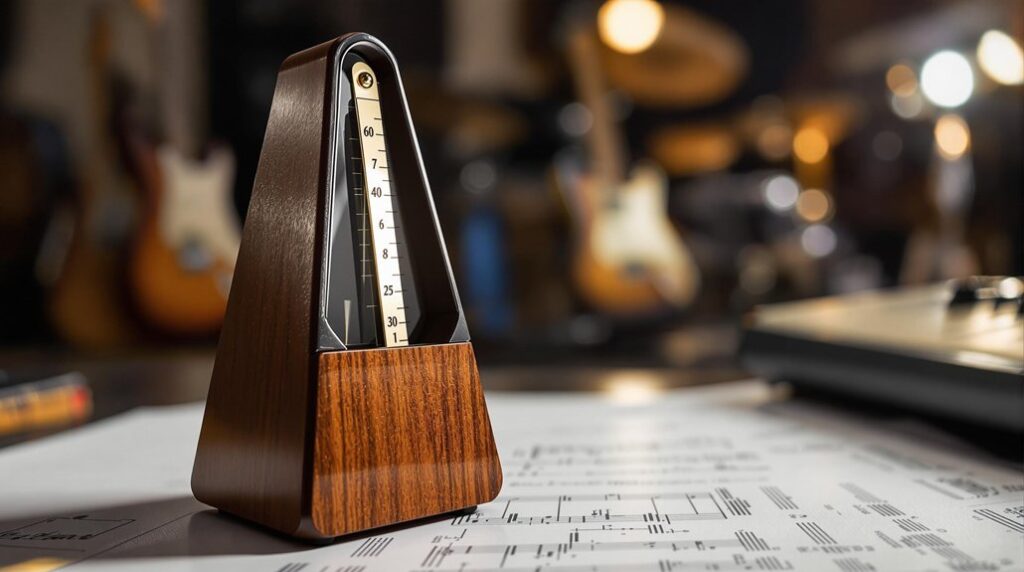For songwriters aiming to deepen their expertise in music theory, essential reads like “Alfred’s Essentials of Music Theory” offer extensive self-study courses with practical listening tests. “Music Theory: From Beginner to Expert” provides hands-on exercises that cater to both beginners and advanced learners. “Music Theory for Beginners” simplifies core concepts of scales, intervals, and key signatures, making complex ideas accessible. These books facilitate a profound understanding of harmony, melody creation, and advanced techniques such as counterpoint and modal exploration. By integrating such resources into practice, songwriters can access new creative potentials and refine their craft effectively. Continue for insight into essential theory applications in songwriting.
Key Takeaways
- “Alfred’s Essentials of Music Theory” offers a thorough curriculum with listening tests and audio examples for in-depth understanding.
- “Music Theory: From Beginner to Expert” includes practical exercises and external audio links for hands-on learning.
- “Music Theory for Beginners” simplifies music notation and theory concepts for easier comprehension.
- Books on music theory provide exercises and examples from successful compositions for practical application in songwriting.
- Advanced concepts like counterpoint, modal exploration, and orchestration techniques enhance songwriting and arrangement skills.
Comprehensive Self-Study Courses
For songwriters looking to deepen their understanding of music theory, extensive self-study courses offer an invaluable resource. These courses, such as “Alfred’s Essentials of Music Theory” and “How to Read Music in 30 Days,” provide a structured approach ideal for self-taught musicians. The self-study benefits of these programs are multifaceted, including the flexibility to learn at one’s own pace and the ability to revisit complex topics as needed.
Course comparisons reveal that “Alfred’s Essentials of Music Theory” excels in providing a thorough curriculum that encompasses a wide range of theoretical concepts, reinforced through listening tests and audio examples. This auditory component is essential for internalizing theoretical knowledge.
On the other hand, “Music Theory: From Beginner to Expert” integrates practical exercises and external audio links, offering a hands-on learning experience that bridges the gap between theory and application.
For those who prefer a streamlined approach, “Music Theory for Beginners” simplifies music notation and theory concepts, making it an excellent choice for building confidence in reading and interpreting sheet music.
Understanding Music Theory Basics
Building on the foundation of thorough self-study courses, songwriters must next direct their focus toward mastering the basics of music theory to truly enhance their craft. At the core of this mastery is proficiency in various notation systems. Learning music notation is fundamental for songwriters, as it allows them to read and write music accurately, facilitating better communication with other musicians and a deeper understanding of their compositions.
Understanding scale degrees and intervals is equally essential. These elements form the backbone of melody and harmony, enabling songwriters to create compelling musical phrases. Furthermore, familiarity with key signatures and time signatures is important, as these notational elements help in structuring songs effectively, ensuring they align with the desired style and feel.
Additionally, mastering rhythm and dynamics is crucial for conveying emotion and energy in songwriting. These elements considerably influence how a piece is perceived and performed. Engaging with exercises that reinforce these basic music theory concepts can greatly enhance a songwriter’s ability to craft melodies and harmonies that resonate with listeners.
| Concept | Importance |
|---|---|
| Notation Systems | Essential for reading and writing music accurately |
| Scale Degrees | Fundamental for creating melody and harmony |
| Key Signatures | Necessary for structuring songs in a coherent style |
| Time Signatures | Critical for ensuring rhythmic accuracy and consistency |
| Rhythm and Dynamics | Key for conveying emotion and energy in musical compositions |
Mastery of these basics sets a solid foundation for more advanced concepts in music theory.
Exploring Harmony and Melody
Harmony and melody are two fundamental pillars of music theory that songwriters must adeptly navigate to create engaging compositions. Harmony is built on the interaction of chords and chord progressions, which provide the emotional depth and structural foundation in songwriting. Mastery of chord progressions allows songwriters to evoke specific moods and shifts, enriching the overall narrative of the piece.
Additionally, understanding frequency interactions helps in making informed audio decisions, ensuring that harmonic elements do not clash but rather complement each other.
In parallel, melodic construction relies heavily on a strong understanding of scales. Scales serve as the blueprint for which notes can be effectively utilized, ensuring that melodies are both coherent and expressive. The relationship between melody and harmony can be scrutinized through analysis of well-known compositions, which reveal how different harmonic choices can dramatically shape the character of melodic lines.
Ear training is indispensable for songwriters, as it enhances their ability to discern and employ harmonic relationships intuitively. This skill is essential for creating melodies that seamlessly align with underlying harmonies.
Practical exercises, such as composing simple chord progressions and crafting accompanying melodies, are instrumental in reinforcing these theoretical concepts. By engaging in these exercises, songwriters can deepen their understanding and practical application of harmony and melody, ultimately leading to more sophisticated and engaging musical works.
Advanced Music Theory Concepts
Delving into advanced music theory concepts opens up a world of intricate and sophisticated compositional techniques that can greatly enhance a songwriter’s craft. A fundamental aspect is the study of counterpoint techniques, which focus on the interaction between independent melodic lines. This approach fosters the creation of complex textures and can considerably enrich the harmonic depth of a composition.
Modal exploration is another critical area, encouraging composers to venture beyond traditional major and minor scales. By experimenting with modes such as Dorian, Phrygian, and Lydian, songwriters can access a broader palette of tonal colors and emotional nuances, offering listeners a unique auditory experience. Additionally, understanding how to prevent frequency masking can guarantee that each tonal element stands out clearly, additionally enhancing the listener’s experience.
Moreover, a deep understanding of orchestration techniques is indispensable for songwriters aiming to arrange their music effectively for diverse instruments. This knowledge enhances the overall texture and richness of the composition, guaranteeing that each instrument’s voice is both distinct and harmonious within the ensemble.
Analyzing musical textures, such as homophony and polyphony, allows songwriters to strategically balance melody and harmony.
In addition, exploring advanced harmonic progressions provides the tools necessary for evoking specific emotional responses, making the music more impactful and resonant with audiences.
Applying Theory in Practice
Having explored intricate music theory concepts, the next step is to effectively integrate these insights into the actual songwriting process. Integrating music theory into songwriting enhances creativity by providing a deeper understanding of scales, chords, and progressions that can inspire unique melodies and harmonies. Mastery of core concepts, such as melody and harmony, is vital for creating compelling compositions.
By analyzing well-known songs, songwriters can identify effective techniques and structures, allowing them to adapt these elements within their own work. This analytical approach not only deepens their theoretical knowledge but also sparks creative inspiration.
Experimenting with chord progressions and melody construction under the guidance of music theory opens new avenues for discovering unique sounds and songwriting techniques. This exploration helps in developing a distinctive musical style that resonates with personal artistic vision.
Ear training, another important aspect, enables songwriters to recognize harmonic relationships, consequently crafting melodies that effectively complement lyrics and convey the intended message.
Setting specific goals to apply learned theoretical concepts in original compositions solidifies understanding and promotes growth in songwriting abilities. By consistently practicing these techniques, songwriters build confidence and proficiency, making theory an integral part of their creative process.
Ultimately, the practical application of music theory transforms abstract knowledge into tangible artistic expression, enriching the songwriter’s craft.
Frequently Asked Questions
Should Songwriters Learn Music Theory?
Songwriters should learn music theory due to its numerous benefits, including enhanced songwriting creativity, deeper understanding of musical structures, improved analytical skills, and more effective communication with collaborators, all of which contribute to more sophisticated and emotionally resonant compositions.
What Is the Best Book for Learning Music Theory?
The Complete Musician by Steven Laitz is highly recommended for its robust exploration of music theory fundamentals and creative songwriting techniques, offering technical expertise, analytical precision, and conceptual depth, making it an invaluable resource for aspiring songwriters.
How Much Music Theory Do You Need to Know to Write Songs?
To write songs effectively, a songwriter should understand fundamental music theory concepts such as scales, chords, and key signatures. This knowledge aids in song structure and melody creation, ensuring a cohesive and emotionally engaging musical work.
How to Write Music Without Knowing Theory?
To write music without knowing theory, focus on creative expression and intuitive writing. Leverage tools like keyboards or guitars, experiment with melodies and chords, use online resources, and collaborate with knowledgeable musicians to refine your compositions.
Conclusion
The recommended literature on music theory for songwriters encompasses a spectrum from foundational principles to advanced concepts, facilitating both self-study and practical application. Mastery of music theory underpins the development of sophisticated harmonic and melodic structures, enabling songwriters to enhance their creative output. These essential reads provide thorough insights necessary for conceptual understanding and technical proficiency, thereby equipping songwriters with the tools to innovatively apply theoretical knowledge in their compositions.




